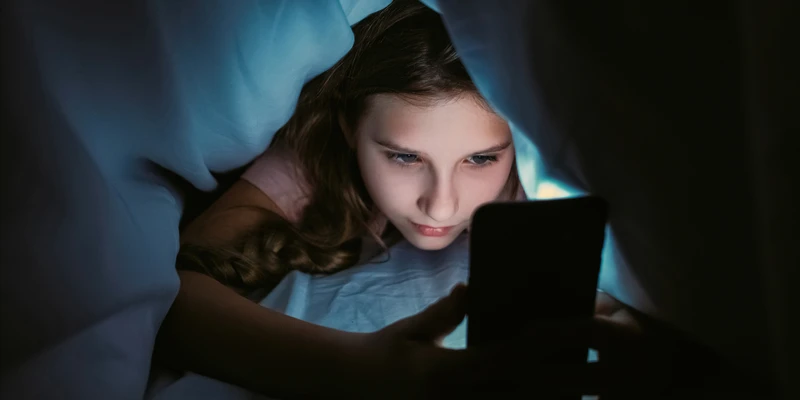Ever find yourself constantly reaching for your phone, scrolling without thinking, or losing hours online without realising it? Maybe it’s a loved one who stays up all night gaming or glued to social media, even when it’s affecting their health. If this sounds familiar, you’re not alone.
Internet addiction has become a global concern, but therapy for compulsive internet behaviour can provide effective help. Whether you’re feeling overwhelmed by screen time or worried about someone else, exploring therapy options is a powerful first step toward a more mindful online life.
What is Internet Addiction?
Internet addiction, or compulsive internet behaviour, is increasingly recognised as a problematic behavioural health issue with real consequences. It shares features with substance use disorders (SUDs) and is often associated with underlying mental health issues like anxiety, depression, or obsessive-compulsive disorder (OCD).
People struggling with internet addiction are unable to control their time online, even when it’s causing harm to their health, relationships, and daily life. While internet addiction is not formally recognised as a distinct disorder in the Diagnostic and Statistical Manual of Mental Disorders (DSM-5), clinicians may use adapted criteria from behavioural addiction models to assess severity.

Symptoms of Internet Addiction
Many people begin turning to the internet as a coping mechanism for stress, boredom, or negative emotions. This form of escapism can lead to spending more and more time online, often losing track of how much time has passed. You may find yourself constantly thinking about online activities or feeling restless, irritable, or anxious when you can’t access the internet.
Other signs include repeated failed attempts to cut back and continuing to use the internet despite negative consequences. Over time, this behaviour can result in social withdrawal, neglect of daily responsibilities, and a decline in overall health. These patterns suggest that internet use may be shifting from a harmless habit to something more compulsive and potentially destructive.
Diagnostic Tools
Several tools can guide mental health professionals in evaluating internet-related behaviours and determining whether they overlap with broader psychological conditions, such as OCD or impulse control disorders. The following instruments can help evaluate problematic or compulsive internet use:
- Internet Addiction Test (IAT): A widely used self-report questionnaire that assesses the extent and impact of internet use on daily life.
- Obsessive-Compulsive Inventory–Revised (OCI-R): A self-report tool that measures the presence and severity of obsessive-compulsive symptoms.
- Yale-Brown Obsessive Compulsive Scale (Y-BOCS): A clinician-administered scale designed to assess OCD symptom severity, and can be useful when internet use resembles OCD patterns.
Therapy for Compulsive Internet Behaviour
Treating internet addiction typically involves evidence-based therapies designed to reduce compulsive use and support long-term well-being. Below are some of the most effective and widely used therapeutic approaches available for individuals struggling with problematic internet use.
Cognitive Behavioural Therapy for Internet Addiction (CBT-IA)
CBT-IA helps individuals examine and modify the thoughts and emotional triggers contributing to problematic patterns of internet use. Techniques often include tracking online time, identifying usage patterns, practising alternative behaviours, and setting realistic goals to reduce screen time.
In a 2013 study, 128 individuals identified with internet addiction were treated with CBT-IA over 12 weekly sessions. At the end of treatment, over 95% regained control over their internet use, and 78% maintained recovery at six‑month follow‑up. These findings suggest that CBT‑IA is effective both for immediate improvement and sustained reduction of internet addiction symptoms.
Internet-Based CBT (ICBT)
ICBT offers the tools of traditional CBT in an online format, making therapy more accessible and flexible. Programmes typically follow structured modules that include interactive lessons, exercises, and quizzes, often with optional therapist support through video, chat, or written feedback.
ICBT is especially beneficial for individuals who may face barriers to in-person therapy, such as remote location, scheduling constraints, or social anxiety. A 2017 review found that it is effective in treating a broad range of psychiatric conditions, including depression, anxiety disorders, OCD, and PTSD.
Dialectical Behaviour Therapy (DBT)
DBT is a promising option for individuals with internet addiction, especially those with emotional dysregulation or co-occurring conditions like borderline personality disorder, depression, or anxiety. It builds skills in mindfulness, distress tolerance, emotional regulation, and interpersonal effectiveness.
In a 2023 study of 60 nursing students, distress tolerance training led to a 70% increase in emotional coping skills and a 17% reduction in problematic internet use, with improvements sustained after three months. This suggests DBT-based interventions may be helpful, particularly among populations with stress-related vulnerabilities.
Motivational Interviewing (MI)
MI is a collaborative, client-centred approach that helps individuals explore and resolve ambivalence about change. Unlike directive or confrontational methods, it encourages self-reflection and supports people in identifying their motivations for healthier behaviour.
MI is particularly useful for addressing internet addiction or compulsive use, especially when individuals struggle with self-control, procrastination, or recognise their problematic patterns of internet use but feel unsure or resistant to making changes.

Holistic Treatment
Holistic therapy integrates the mind, body, and behaviour to promote overall well-being. It cultivates present-moment awareness, helping individuals gain greater control over compulsive online behaviours while supporting emotional regulation.
Practices such as meditation, mindfulness, and equine-assisted therapy, when combined with other therapeutic strategies, can enhance treatment outcomes by addressing the physical, psychological, emotional, and behavioural aspects of internet addiction.
Group Therapy
Internet addiction often impacts an individual’s relationships and sense of connection. Group therapy offers a supportive and educational environment where people with similar struggles can share experiences, address personal challenges, and develop healthier habits together.
These sessions foster mutual understanding and provide a network of encouragement, which can be crucial for recovery. Being part of a group helps individuals build social skills and accountability, enhancing their motivation to maintain lasting change.
What Causes Internet Addiction?
Several factors contribute to the development of internet addiction. Individual vulnerabilities, such as certain personality traits like impulsivity and low self-esteem, can increase the tendency to engage in excessive internet use. Depression and anxiety can also direct individuals to seek comfort or distraction by engaging in online activities.
Sociocultural influences also play a role, with peer pressure and social norms promoting constant online engagement. Additionally, the addictive design of many online platforms intensifies the risk. Activities such as social media use, online gaming, and viewing pornography are often designed to capture attention and encourage prolonged use.
Understanding the Impact of Compulsive Internet Use
Spending too much time online is becoming increasingly common, especially among young people and those who rely on the internet for personal and professional reasons. Many internet users also experience symptoms that match patterns of compulsive or addictive behaviour.
Internet addiction may affect multiple areas of life, including mental, physical, and social well-being. It is linked to higher risks of mental health issues like depression, anxiety, ADHD, and substance use. The constant need to keep up with online life and pressure to present a perfect image can also lead to stress, low self-esteem, and loneliness.
When it comes to physical health, too much screen time is associated with problems like poor sleep, lack of physical activity, weight gain, eye strain, and headaches. Socially, it can cause people to isolate themselves from real-life relationships and struggle with communication or emotional connection.
Getting help early can prevent these problems from escalating. The sooner you seek support, the better your chances of recovery and restoring balance in your life.

Addressing Common Barriers in Treatment
Many people avoid seeking help for internet addiction treatment due to shame or fear of being judged. Unfortunately, the condition is often misunderstood as a lack of willpower or discipline rather than a real mental health concern. Public education, mental health awareness, and open, supportive conversations can help reduce stigma and make it easier for individuals to reach out.
No two people experience internet addiction in the same way. The good news is that therapists can tailor treatment to meet each individual’s needs, whether through cultural sensitivity, language adaptations, or adjustments for learning styles or co-occurring conditions. Removing these obstacles helps improve engagement and leads to better long-term outcomes.
Get Treatment for Internet Addiction
If you or a loved one is struggling to manage time spent online or is exhibiting signs of internet addiction, help is within reach. Sierra Recovery provides specialised treatment programmes to address various types of addiction, including substance and behavioural addictions. Don’t wait for things to escalate – reach out today to start your recovery journey.
Frequently Asked Questions
What are the most effective treatment approaches for compulsive online activity?
CBT is one of the most effective approaches in managing compulsive online activity. It helps individuals recognise and change harmful thought patterns that drive internet use. Many treatment programmes also include group therapy and individual counselling.
How can cognitive behavioural therapy be used to manage excessive internet use?
CBT helps individuals identify triggers behind problematic online habits and develop strategies to manage them. With a therapist's guidance, you can create healthier routines and gradually replace internet overuse with more positive behaviours.
What strategies are recommended to self-regulate internet usage and prevent compulsive behaviour?
Setting time limits and blocking apps can help reduce temptation. Keeping a journal to track screen time and turning to offline activities, such as physical exercise or reading a book, can also be useful.
Are there any support groups or communities for individuals struggling with internet addiction?
Yes, both online and in-person support groups exist to help those struggling with internet addiction. Many of them are based on 12-step programmes and are hosted by mental health organisations and community treatment centres.
How can friends and family support a loved one dealing with compulsive internet habits?
Loved ones can offer support by actively listening without judgment and encouraging open communication. Gently suggesting professional help and engaging in offline activities together can also make a positive difference.
What are the warning signs that indicate internet use has become problematic and may require intervention?
Red flags include spending excessive time online, displaying mood swings when not connected, and avoiding responsibilities or social interaction due to internet use. If relationships, physical or mental health, are being affected, it may be time to seek professional help.






